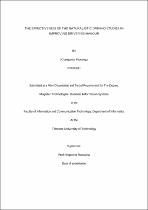 ResearchSpace
ResearchSpace
The effectiveness of the naturalistic driving studies in improving driver behaviour
JavaScript is disabled for your browser. Some features of this site may not work without it.
- ResearchSpace
- →
- Archives collection
- →
- Open Access Reports
- →
- View Item
| dc.contributor.author |
Muronga, Khangwelo

|
|
| dc.date.accessioned | 2017-08-31T07:17:30Z | |
| dc.date.available | 2017-08-31T07:17:30Z | |
| dc.date.issued | 2017-02 | |
| dc.identifier.citation | Muronga, K. 2017. The effectiveness of the naturalistic driving studies in improving driver behaviour. Submitted as a Mini-Dissertation and Partial Requirement for The Degree: Magister Technologiae: Business Information Systems, Tshwane University of Technology. | en_US |
| dc.identifier.uri | http://hdl.handle.net/10204/9515 | |
| dc.description | Submitted as a Mini-Dissertation and Partial Requirement for The Degree: Magister Technologiae: Business Information Systems, Tshwane University of Technology. | en_US |
| dc.description.abstract | The Naturalistic Driving Studies (NDS) are research methods that have the ability to improve existing methods for collecting data about driver performance and driver behaviour in normal driving conditions. The purpose of this research is to evaluate the effectiveness of the NDS in improving driver behaviour and adherence to road rules by making use of the elements of the theory of planned behaviour as a framework. To achieve the purpose of the study, it was necessary for the research to be conducted in two phases. The first phase of the research involved data collection through questionnaires, to address opinions of the NDS users in relation to its effectiveness since implementation. The second phase involved making use of data already collected by a company operating in the heavy vehicle industry that made use of NDS technology to monitor driver behaviour. Analysis of naturalistic driving data in normal driving conditions provides a possibility of big data sets that can be used to understand the characteristics that could lead to vehicle crashes and/or near crashes. The results of the study showed that the technology used is able to arrive at expected conclusions and set objectives. Making use of the Theory of Planned Behaviour, the study managed to illicit responses from both drivers and management, who both showed that they are happy with the NDS as it provides them with information that can improve driving ability as well as offer security to drivers, as the system also offers warning to prevent or counter high-jacking and theft of cargo. The study also recommends that more organisations should embark on making use of this technology in order to improve road safety. Researchers are also recommended to make use of the data to learn more about driver behaviour so as to use the knowledge to implement effective road safety strategies and initiatives. | en_US |
| dc.language.iso | en | en_US |
| dc.relation.ispartofseries | Worklist;19032 | |
| dc.subject | Naturalistic Driving Studies | en_US |
| dc.subject | Road Safety | en_US |
| dc.subject | Driver Monitoring | en_US |
| dc.subject | Driver Behaviour | en_US |
| dc.subject | Transportation Technologies | en_US |
| dc.title | The effectiveness of the naturalistic driving studies in improving driver behaviour | en_US |
| dc.type | Report | en_US |
| dc.identifier.apacitation | Muronga, K. (2017). <i>The effectiveness of the naturalistic driving studies in improving driver behaviour</i> (Worklist;19032). Retrieved from http://hdl.handle.net/10204/9515 | en_ZA |
| dc.identifier.chicagocitation | Muronga, Khangwelo <i>The effectiveness of the naturalistic driving studies in improving driver behaviour.</i> Worklist;19032. 2017. http://hdl.handle.net/10204/9515 | en_ZA |
| dc.identifier.vancouvercitation | Muronga K. The effectiveness of the naturalistic driving studies in improving driver behaviour. 2017 [cited yyyy month dd]. Available from: http://hdl.handle.net/10204/9515 | en_ZA |
| dc.identifier.ris | TY - Report AU - Muronga, Khangwelo AB - The Naturalistic Driving Studies (NDS) are research methods that have the ability to improve existing methods for collecting data about driver performance and driver behaviour in normal driving conditions. The purpose of this research is to evaluate the effectiveness of the NDS in improving driver behaviour and adherence to road rules by making use of the elements of the theory of planned behaviour as a framework. To achieve the purpose of the study, it was necessary for the research to be conducted in two phases. The first phase of the research involved data collection through questionnaires, to address opinions of the NDS users in relation to its effectiveness since implementation. The second phase involved making use of data already collected by a company operating in the heavy vehicle industry that made use of NDS technology to monitor driver behaviour. Analysis of naturalistic driving data in normal driving conditions provides a possibility of big data sets that can be used to understand the characteristics that could lead to vehicle crashes and/or near crashes. The results of the study showed that the technology used is able to arrive at expected conclusions and set objectives. Making use of the Theory of Planned Behaviour, the study managed to illicit responses from both drivers and management, who both showed that they are happy with the NDS as it provides them with information that can improve driving ability as well as offer security to drivers, as the system also offers warning to prevent or counter high-jacking and theft of cargo. The study also recommends that more organisations should embark on making use of this technology in order to improve road safety. Researchers are also recommended to make use of the data to learn more about driver behaviour so as to use the knowledge to implement effective road safety strategies and initiatives. DA - 2017-02 DB - ResearchSpace DP - CSIR KW - Naturalistic Driving Studies KW - Road Safety KW - Driver Monitoring KW - Driver Behaviour KW - Transportation Technologies LK - https://researchspace.csir.co.za PY - 2017 T1 - The effectiveness of the naturalistic driving studies in improving driver behaviour TI - The effectiveness of the naturalistic driving studies in improving driver behaviour UR - http://hdl.handle.net/10204/9515 ER - | en_ZA |





